Total Reward System: Motivation, Theories, and Sector Analysis
VerifiedAdded on 2020/07/22
|10
|3604
|26
Essay
AI Summary
This essay delves into the concept of total reward systems, examining their significance in enhancing employee motivation and satisfaction within organizations. It provides a comprehensive overview of total rewards, encompassing compensation, benefits, recognition, and opportunities for growth and development. The essay connects total reward strategies with prominent motivational theories such as Maslow's Hierarchy of Needs, Herzberg's Two-Factor Theory, Vroom's Expectancy Theory, and Porter and Lawler's theory, highlighting how these systems align with and influence employee behavior. Furthermore, the essay evaluates the practical implementation and effectiveness of total reward systems across two distinct sectors: healthcare and hospitality. It analyzes how these systems impact employee retention, performance, and the overall success of organizations within these sectors, providing insights into the benefits and drawbacks of this approach. The analysis includes specific examples of how total reward systems are designed and implemented in each sector and their impact on employee morale and productivity.
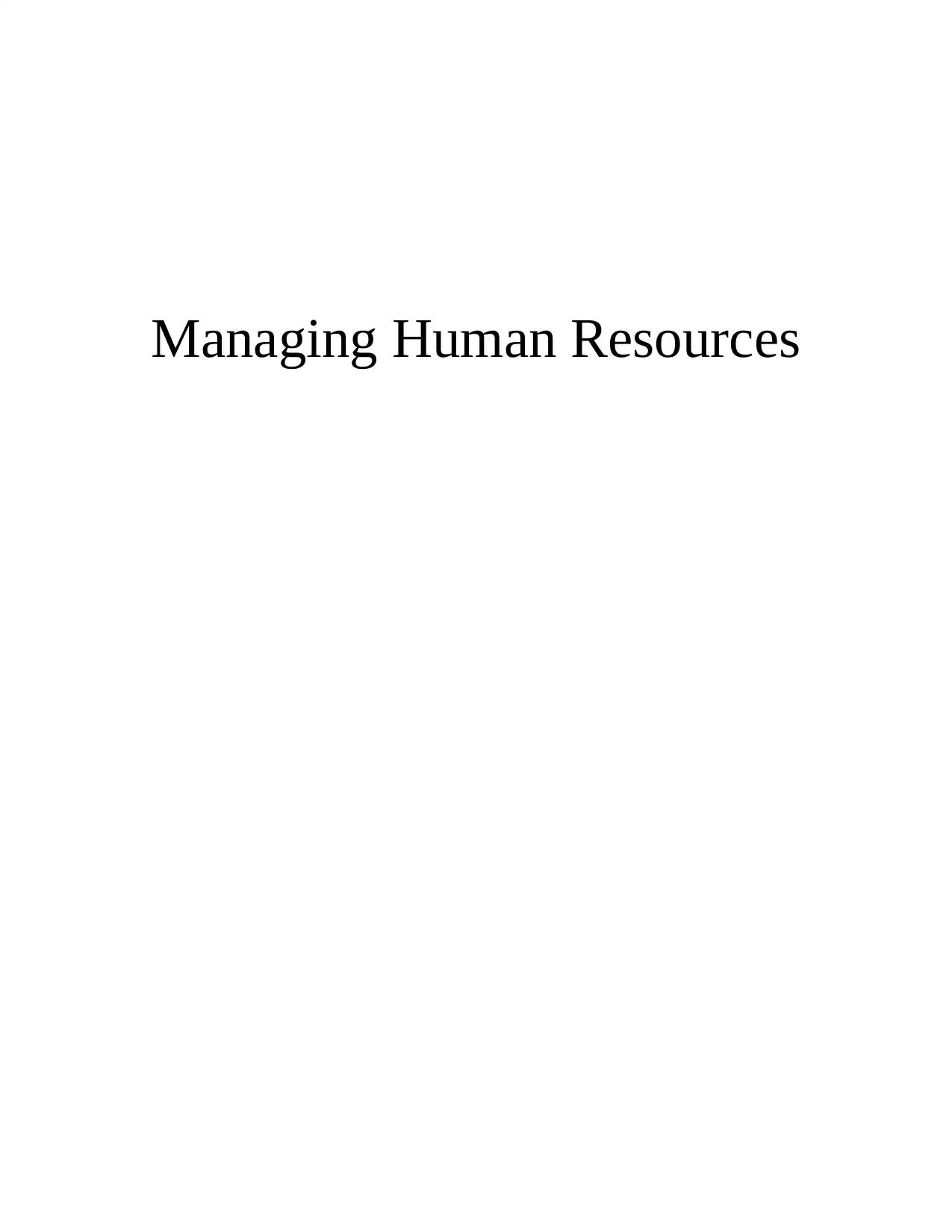
Managing Human Resources
Paraphrase This Document
Need a fresh take? Get an instant paraphrase of this document with our AI Paraphraser
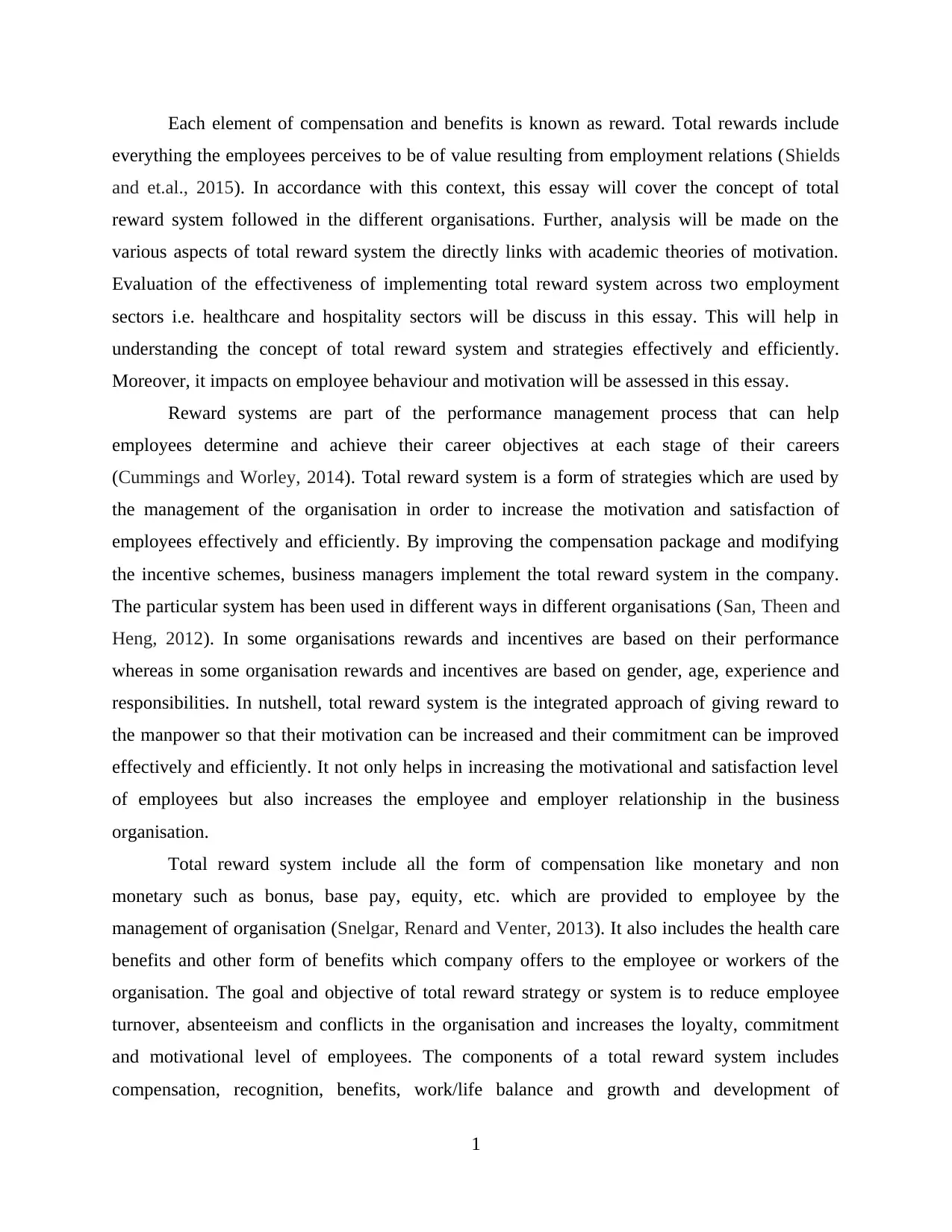
Each element of compensation and benefits is known as reward. Total rewards include
everything the employees perceives to be of value resulting from employment relations (Shields
and et.al., 2015). In accordance with this context, this essay will cover the concept of total
reward system followed in the different organisations. Further, analysis will be made on the
various aspects of total reward system the directly links with academic theories of motivation.
Evaluation of the effectiveness of implementing total reward system across two employment
sectors i.e. healthcare and hospitality sectors will be discuss in this essay. This will help in
understanding the concept of total reward system and strategies effectively and efficiently.
Moreover, it impacts on employee behaviour and motivation will be assessed in this essay.
Reward systems are part of the performance management process that can help
employees determine and achieve their career objectives at each stage of their careers
(Cummings and Worley, 2014). Total reward system is a form of strategies which are used by
the management of the organisation in order to increase the motivation and satisfaction of
employees effectively and efficiently. By improving the compensation package and modifying
the incentive schemes, business managers implement the total reward system in the company.
The particular system has been used in different ways in different organisations (San, Theen and
Heng, 2012). In some organisations rewards and incentives are based on their performance
whereas in some organisation rewards and incentives are based on gender, age, experience and
responsibilities. In nutshell, total reward system is the integrated approach of giving reward to
the manpower so that their motivation can be increased and their commitment can be improved
effectively and efficiently. It not only helps in increasing the motivational and satisfaction level
of employees but also increases the employee and employer relationship in the business
organisation.
Total reward system include all the form of compensation like monetary and non
monetary such as bonus, base pay, equity, etc. which are provided to employee by the
management of organisation (Snelgar, Renard and Venter, 2013). It also includes the health care
benefits and other form of benefits which company offers to the employee or workers of the
organisation. The goal and objective of total reward strategy or system is to reduce employee
turnover, absenteeism and conflicts in the organisation and increases the loyalty, commitment
and motivational level of employees. The components of a total reward system includes
compensation, recognition, benefits, work/life balance and growth and development of
1
everything the employees perceives to be of value resulting from employment relations (Shields
and et.al., 2015). In accordance with this context, this essay will cover the concept of total
reward system followed in the different organisations. Further, analysis will be made on the
various aspects of total reward system the directly links with academic theories of motivation.
Evaluation of the effectiveness of implementing total reward system across two employment
sectors i.e. healthcare and hospitality sectors will be discuss in this essay. This will help in
understanding the concept of total reward system and strategies effectively and efficiently.
Moreover, it impacts on employee behaviour and motivation will be assessed in this essay.
Reward systems are part of the performance management process that can help
employees determine and achieve their career objectives at each stage of their careers
(Cummings and Worley, 2014). Total reward system is a form of strategies which are used by
the management of the organisation in order to increase the motivation and satisfaction of
employees effectively and efficiently. By improving the compensation package and modifying
the incentive schemes, business managers implement the total reward system in the company.
The particular system has been used in different ways in different organisations (San, Theen and
Heng, 2012). In some organisations rewards and incentives are based on their performance
whereas in some organisation rewards and incentives are based on gender, age, experience and
responsibilities. In nutshell, total reward system is the integrated approach of giving reward to
the manpower so that their motivation can be increased and their commitment can be improved
effectively and efficiently. It not only helps in increasing the motivational and satisfaction level
of employees but also increases the employee and employer relationship in the business
organisation.
Total reward system include all the form of compensation like monetary and non
monetary such as bonus, base pay, equity, etc. which are provided to employee by the
management of organisation (Snelgar, Renard and Venter, 2013). It also includes the health care
benefits and other form of benefits which company offers to the employee or workers of the
organisation. The goal and objective of total reward strategy or system is to reduce employee
turnover, absenteeism and conflicts in the organisation and increases the loyalty, commitment
and motivational level of employees. The components of a total reward system includes
compensation, recognition, benefits, work/life balance and growth and development of
1
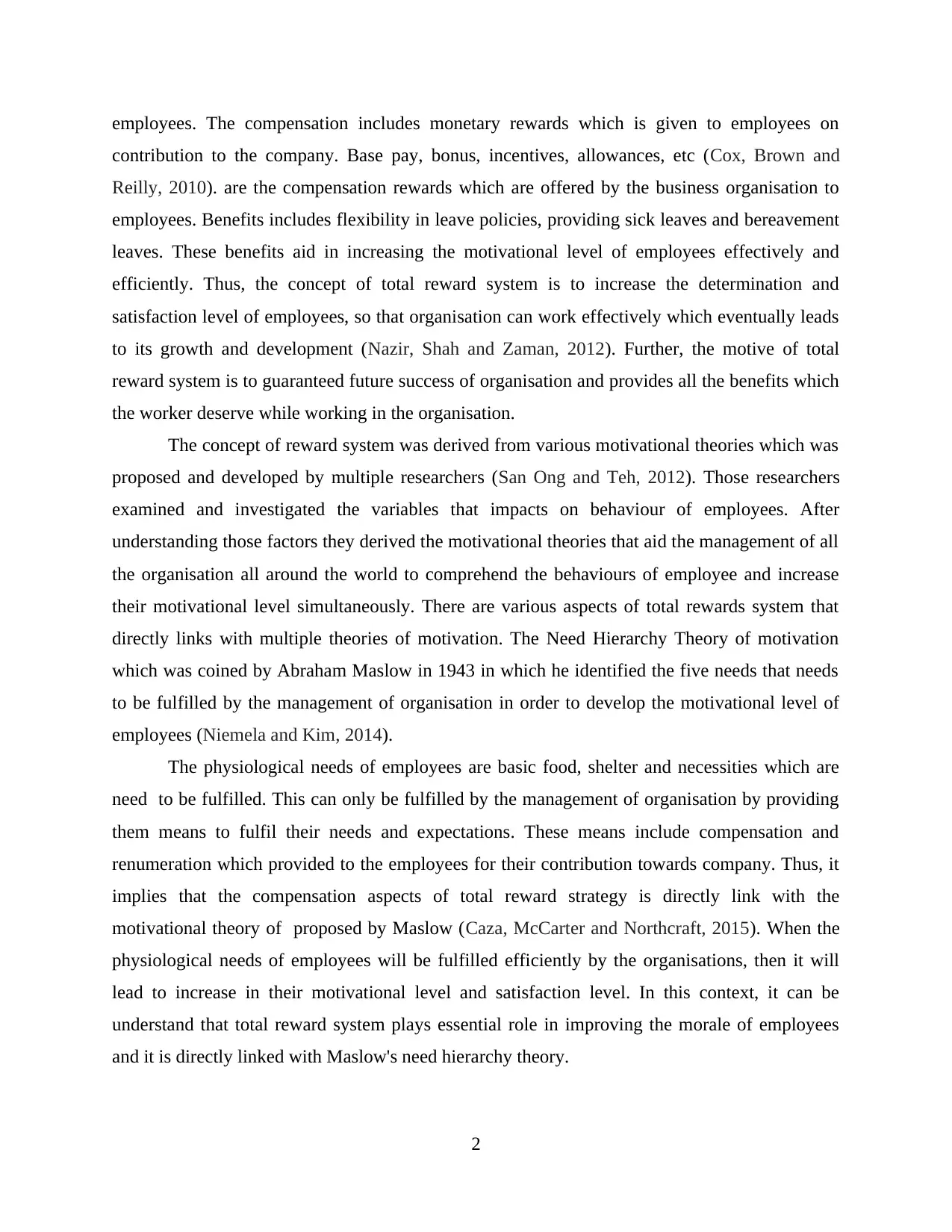
employees. The compensation includes monetary rewards which is given to employees on
contribution to the company. Base pay, bonus, incentives, allowances, etc (Cox, Brown and
Reilly, 2010). are the compensation rewards which are offered by the business organisation to
employees. Benefits includes flexibility in leave policies, providing sick leaves and bereavement
leaves. These benefits aid in increasing the motivational level of employees effectively and
efficiently. Thus, the concept of total reward system is to increase the determination and
satisfaction level of employees, so that organisation can work effectively which eventually leads
to its growth and development (Nazir, Shah and Zaman, 2012). Further, the motive of total
reward system is to guaranteed future success of organisation and provides all the benefits which
the worker deserve while working in the organisation.
The concept of reward system was derived from various motivational theories which was
proposed and developed by multiple researchers (San Ong and Teh, 2012). Those researchers
examined and investigated the variables that impacts on behaviour of employees. After
understanding those factors they derived the motivational theories that aid the management of all
the organisation all around the world to comprehend the behaviours of employee and increase
their motivational level simultaneously. There are various aspects of total rewards system that
directly links with multiple theories of motivation. The Need Hierarchy Theory of motivation
which was coined by Abraham Maslow in 1943 in which he identified the five needs that needs
to be fulfilled by the management of organisation in order to develop the motivational level of
employees (Niemela and Kim, 2014).
The physiological needs of employees are basic food, shelter and necessities which are
need to be fulfilled. This can only be fulfilled by the management of organisation by providing
them means to fulfil their needs and expectations. These means include compensation and
renumeration which provided to the employees for their contribution towards company. Thus, it
implies that the compensation aspects of total reward strategy is directly link with the
motivational theory of proposed by Maslow (Caza, McCarter and Northcraft, 2015). When the
physiological needs of employees will be fulfilled efficiently by the organisations, then it will
lead to increase in their motivational level and satisfaction level. In this context, it can be
understand that total reward system plays essential role in improving the morale of employees
and it is directly linked with Maslow's need hierarchy theory.
2
contribution to the company. Base pay, bonus, incentives, allowances, etc (Cox, Brown and
Reilly, 2010). are the compensation rewards which are offered by the business organisation to
employees. Benefits includes flexibility in leave policies, providing sick leaves and bereavement
leaves. These benefits aid in increasing the motivational level of employees effectively and
efficiently. Thus, the concept of total reward system is to increase the determination and
satisfaction level of employees, so that organisation can work effectively which eventually leads
to its growth and development (Nazir, Shah and Zaman, 2012). Further, the motive of total
reward system is to guaranteed future success of organisation and provides all the benefits which
the worker deserve while working in the organisation.
The concept of reward system was derived from various motivational theories which was
proposed and developed by multiple researchers (San Ong and Teh, 2012). Those researchers
examined and investigated the variables that impacts on behaviour of employees. After
understanding those factors they derived the motivational theories that aid the management of all
the organisation all around the world to comprehend the behaviours of employee and increase
their motivational level simultaneously. There are various aspects of total rewards system that
directly links with multiple theories of motivation. The Need Hierarchy Theory of motivation
which was coined by Abraham Maslow in 1943 in which he identified the five needs that needs
to be fulfilled by the management of organisation in order to develop the motivational level of
employees (Niemela and Kim, 2014).
The physiological needs of employees are basic food, shelter and necessities which are
need to be fulfilled. This can only be fulfilled by the management of organisation by providing
them means to fulfil their needs and expectations. These means include compensation and
renumeration which provided to the employees for their contribution towards company. Thus, it
implies that the compensation aspects of total reward strategy is directly link with the
motivational theory of proposed by Maslow (Caza, McCarter and Northcraft, 2015). When the
physiological needs of employees will be fulfilled efficiently by the organisations, then it will
lead to increase in their motivational level and satisfaction level. In this context, it can be
understand that total reward system plays essential role in improving the morale of employees
and it is directly linked with Maslow's need hierarchy theory.
2
⊘ This is a preview!⊘
Do you want full access?
Subscribe today to unlock all pages.

Trusted by 1+ million students worldwide
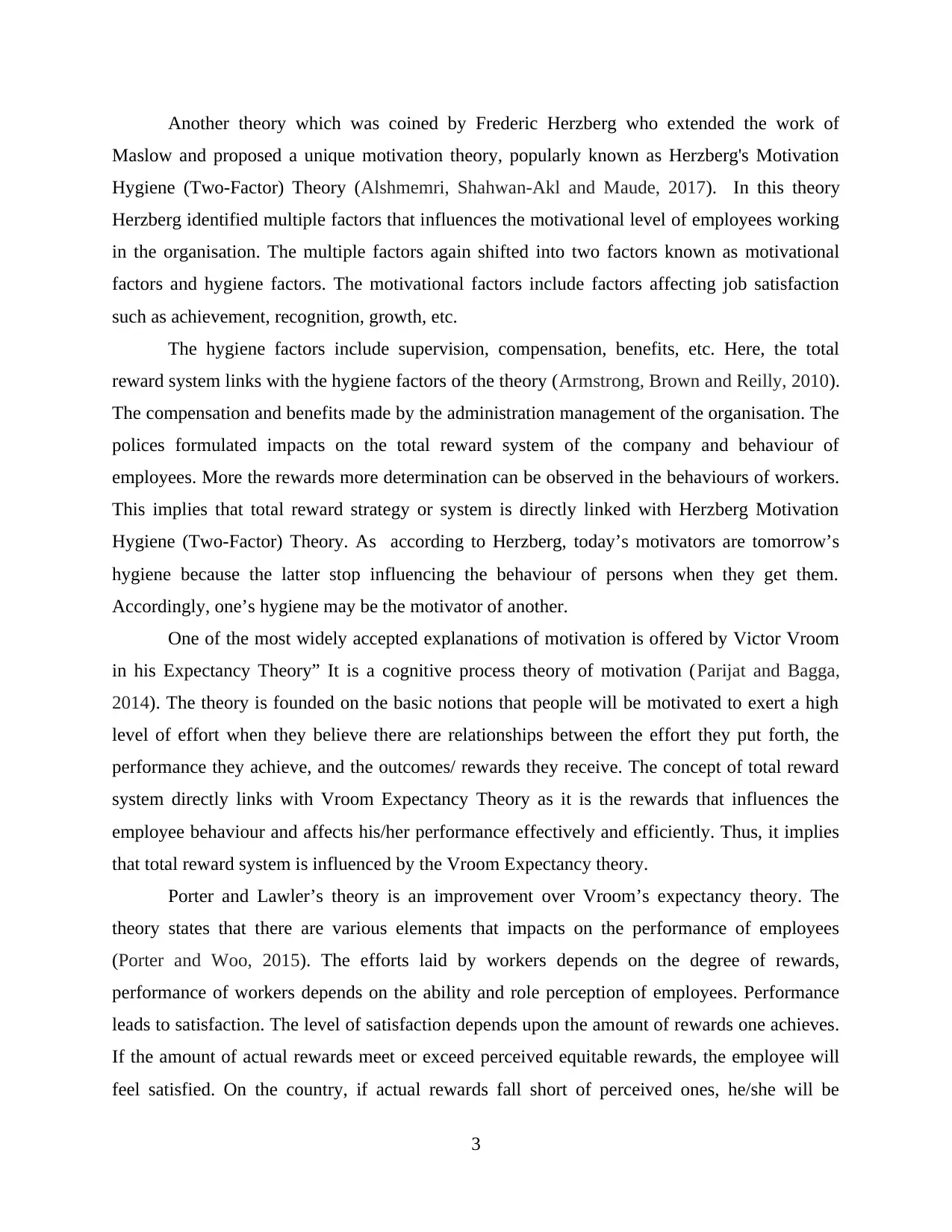
Another theory which was coined by Frederic Herzberg who extended the work of
Maslow and proposed a unique motivation theory, popularly known as Herzberg's Motivation
Hygiene (Two-Factor) Theory (Alshmemri, Shahwan-Akl and Maude, 2017). In this theory
Herzberg identified multiple factors that influences the motivational level of employees working
in the organisation. The multiple factors again shifted into two factors known as motivational
factors and hygiene factors. The motivational factors include factors affecting job satisfaction
such as achievement, recognition, growth, etc.
The hygiene factors include supervision, compensation, benefits, etc. Here, the total
reward system links with the hygiene factors of the theory (Armstrong, Brown and Reilly, 2010).
The compensation and benefits made by the administration management of the organisation. The
polices formulated impacts on the total reward system of the company and behaviour of
employees. More the rewards more determination can be observed in the behaviours of workers.
This implies that total reward strategy or system is directly linked with Herzberg Motivation
Hygiene (Two-Factor) Theory. As according to Herzberg, today’s motivators are tomorrow’s
hygiene because the latter stop influencing the behaviour of persons when they get them.
Accordingly, one’s hygiene may be the motivator of another.
One of the most widely accepted explanations of motivation is offered by Victor Vroom
in his Expectancy Theory” It is a cognitive process theory of motivation (Parijat and Bagga,
2014). The theory is founded on the basic notions that people will be motivated to exert a high
level of effort when they believe there are relationships between the effort they put forth, the
performance they achieve, and the outcomes/ rewards they receive. The concept of total reward
system directly links with Vroom Expectancy Theory as it is the rewards that influences the
employee behaviour and affects his/her performance effectively and efficiently. Thus, it implies
that total reward system is influenced by the Vroom Expectancy theory.
Porter and Lawler’s theory is an improvement over Vroom’s expectancy theory. The
theory states that there are various elements that impacts on the performance of employees
(Porter and Woo, 2015). The efforts laid by workers depends on the degree of rewards,
performance of workers depends on the ability and role perception of employees. Performance
leads to satisfaction. The level of satisfaction depends upon the amount of rewards one achieves.
If the amount of actual rewards meet or exceed perceived equitable rewards, the employee will
feel satisfied. On the country, if actual rewards fall short of perceived ones, he/she will be
3
Maslow and proposed a unique motivation theory, popularly known as Herzberg's Motivation
Hygiene (Two-Factor) Theory (Alshmemri, Shahwan-Akl and Maude, 2017). In this theory
Herzberg identified multiple factors that influences the motivational level of employees working
in the organisation. The multiple factors again shifted into two factors known as motivational
factors and hygiene factors. The motivational factors include factors affecting job satisfaction
such as achievement, recognition, growth, etc.
The hygiene factors include supervision, compensation, benefits, etc. Here, the total
reward system links with the hygiene factors of the theory (Armstrong, Brown and Reilly, 2010).
The compensation and benefits made by the administration management of the organisation. The
polices formulated impacts on the total reward system of the company and behaviour of
employees. More the rewards more determination can be observed in the behaviours of workers.
This implies that total reward strategy or system is directly linked with Herzberg Motivation
Hygiene (Two-Factor) Theory. As according to Herzberg, today’s motivators are tomorrow’s
hygiene because the latter stop influencing the behaviour of persons when they get them.
Accordingly, one’s hygiene may be the motivator of another.
One of the most widely accepted explanations of motivation is offered by Victor Vroom
in his Expectancy Theory” It is a cognitive process theory of motivation (Parijat and Bagga,
2014). The theory is founded on the basic notions that people will be motivated to exert a high
level of effort when they believe there are relationships between the effort they put forth, the
performance they achieve, and the outcomes/ rewards they receive. The concept of total reward
system directly links with Vroom Expectancy Theory as it is the rewards that influences the
employee behaviour and affects his/her performance effectively and efficiently. Thus, it implies
that total reward system is influenced by the Vroom Expectancy theory.
Porter and Lawler’s theory is an improvement over Vroom’s expectancy theory. The
theory states that there are various elements that impacts on the performance of employees
(Porter and Woo, 2015). The efforts laid by workers depends on the degree of rewards,
performance of workers depends on the ability and role perception of employees. Performance
leads to satisfaction. The level of satisfaction depends upon the amount of rewards one achieves.
If the amount of actual rewards meet or exceed perceived equitable rewards, the employee will
feel satisfied. On the country, if actual rewards fall short of perceived ones, he/she will be
3
Paraphrase This Document
Need a fresh take? Get an instant paraphrase of this document with our AI Paraphraser
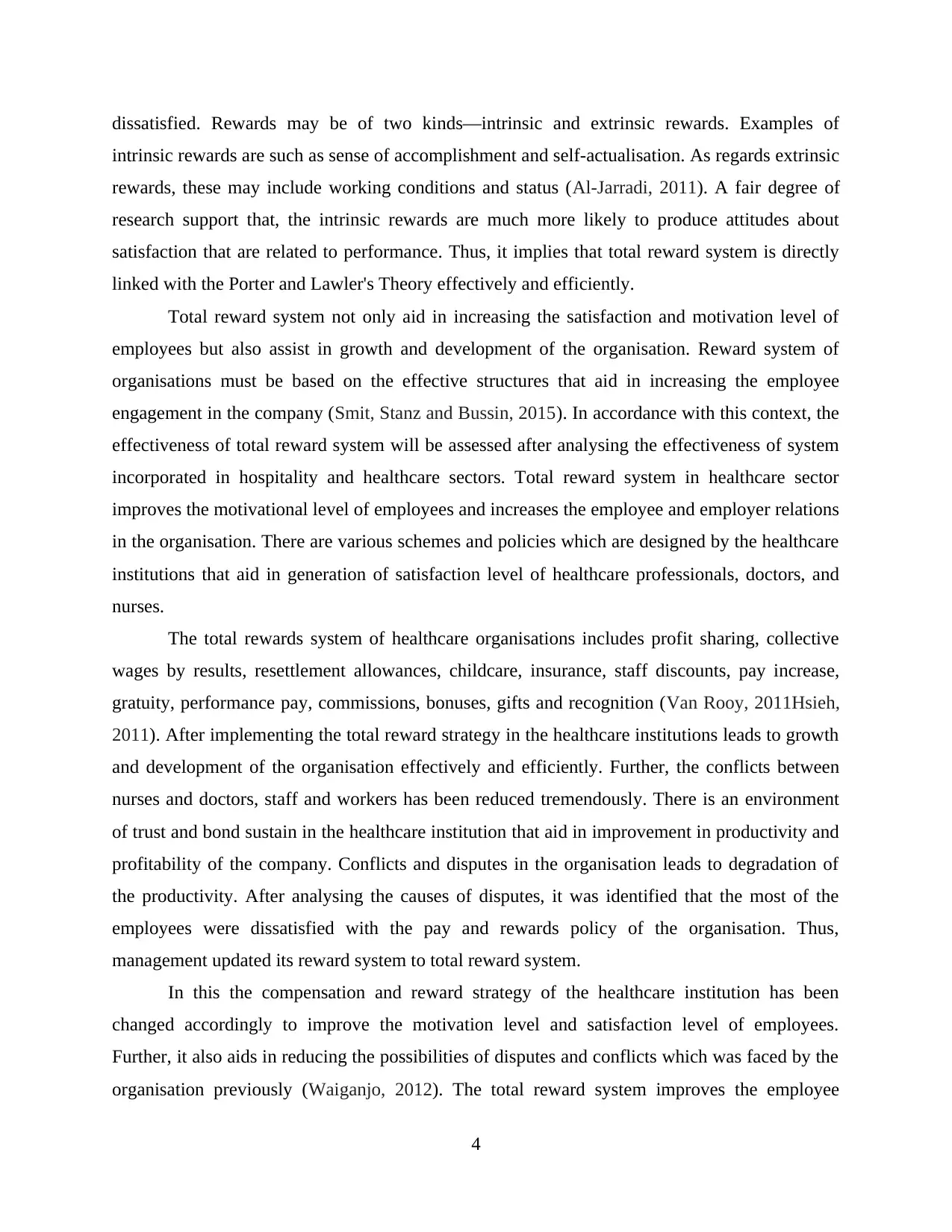
dissatisfied. Rewards may be of two kinds—intrinsic and extrinsic rewards. Examples of
intrinsic rewards are such as sense of accomplishment and self-actualisation. As regards extrinsic
rewards, these may include working conditions and status (Al-Jarradi, 2011). A fair degree of
research support that, the intrinsic rewards are much more likely to produce attitudes about
satisfaction that are related to performance. Thus, it implies that total reward system is directly
linked with the Porter and Lawler's Theory effectively and efficiently.
Total reward system not only aid in increasing the satisfaction and motivation level of
employees but also assist in growth and development of the organisation. Reward system of
organisations must be based on the effective structures that aid in increasing the employee
engagement in the company (Smit, Stanz and Bussin, 2015). In accordance with this context, the
effectiveness of total reward system will be assessed after analysing the effectiveness of system
incorporated in hospitality and healthcare sectors. Total reward system in healthcare sector
improves the motivational level of employees and increases the employee and employer relations
in the organisation. There are various schemes and policies which are designed by the healthcare
institutions that aid in generation of satisfaction level of healthcare professionals, doctors, and
nurses.
The total rewards system of healthcare organisations includes profit sharing, collective
wages by results, resettlement allowances, childcare, insurance, staff discounts, pay increase,
gratuity, performance pay, commissions, bonuses, gifts and recognition (Van Rooy, 2011Hsieh,
2011). After implementing the total reward strategy in the healthcare institutions leads to growth
and development of the organisation effectively and efficiently. Further, the conflicts between
nurses and doctors, staff and workers has been reduced tremendously. There is an environment
of trust and bond sustain in the healthcare institution that aid in improvement in productivity and
profitability of the company. Conflicts and disputes in the organisation leads to degradation of
the productivity. After analysing the causes of disputes, it was identified that the most of the
employees were dissatisfied with the pay and rewards policy of the organisation. Thus,
management updated its reward system to total reward system.
In this the compensation and reward strategy of the healthcare institution has been
changed accordingly to improve the motivation level and satisfaction level of employees.
Further, it also aids in reducing the possibilities of disputes and conflicts which was faced by the
organisation previously (Waiganjo, 2012). The total reward system improves the employee
4
intrinsic rewards are such as sense of accomplishment and self-actualisation. As regards extrinsic
rewards, these may include working conditions and status (Al-Jarradi, 2011). A fair degree of
research support that, the intrinsic rewards are much more likely to produce attitudes about
satisfaction that are related to performance. Thus, it implies that total reward system is directly
linked with the Porter and Lawler's Theory effectively and efficiently.
Total reward system not only aid in increasing the satisfaction and motivation level of
employees but also assist in growth and development of the organisation. Reward system of
organisations must be based on the effective structures that aid in increasing the employee
engagement in the company (Smit, Stanz and Bussin, 2015). In accordance with this context, the
effectiveness of total reward system will be assessed after analysing the effectiveness of system
incorporated in hospitality and healthcare sectors. Total reward system in healthcare sector
improves the motivational level of employees and increases the employee and employer relations
in the organisation. There are various schemes and policies which are designed by the healthcare
institutions that aid in generation of satisfaction level of healthcare professionals, doctors, and
nurses.
The total rewards system of healthcare organisations includes profit sharing, collective
wages by results, resettlement allowances, childcare, insurance, staff discounts, pay increase,
gratuity, performance pay, commissions, bonuses, gifts and recognition (Van Rooy, 2011Hsieh,
2011). After implementing the total reward strategy in the healthcare institutions leads to growth
and development of the organisation effectively and efficiently. Further, the conflicts between
nurses and doctors, staff and workers has been reduced tremendously. There is an environment
of trust and bond sustain in the healthcare institution that aid in improvement in productivity and
profitability of the company. Conflicts and disputes in the organisation leads to degradation of
the productivity. After analysing the causes of disputes, it was identified that the most of the
employees were dissatisfied with the pay and rewards policy of the organisation. Thus,
management updated its reward system to total reward system.
In this the compensation and reward strategy of the healthcare institution has been
changed accordingly to improve the motivation level and satisfaction level of employees.
Further, it also aids in reducing the possibilities of disputes and conflicts which was faced by the
organisation previously (Waiganjo, 2012). The total reward system improves the employee
4
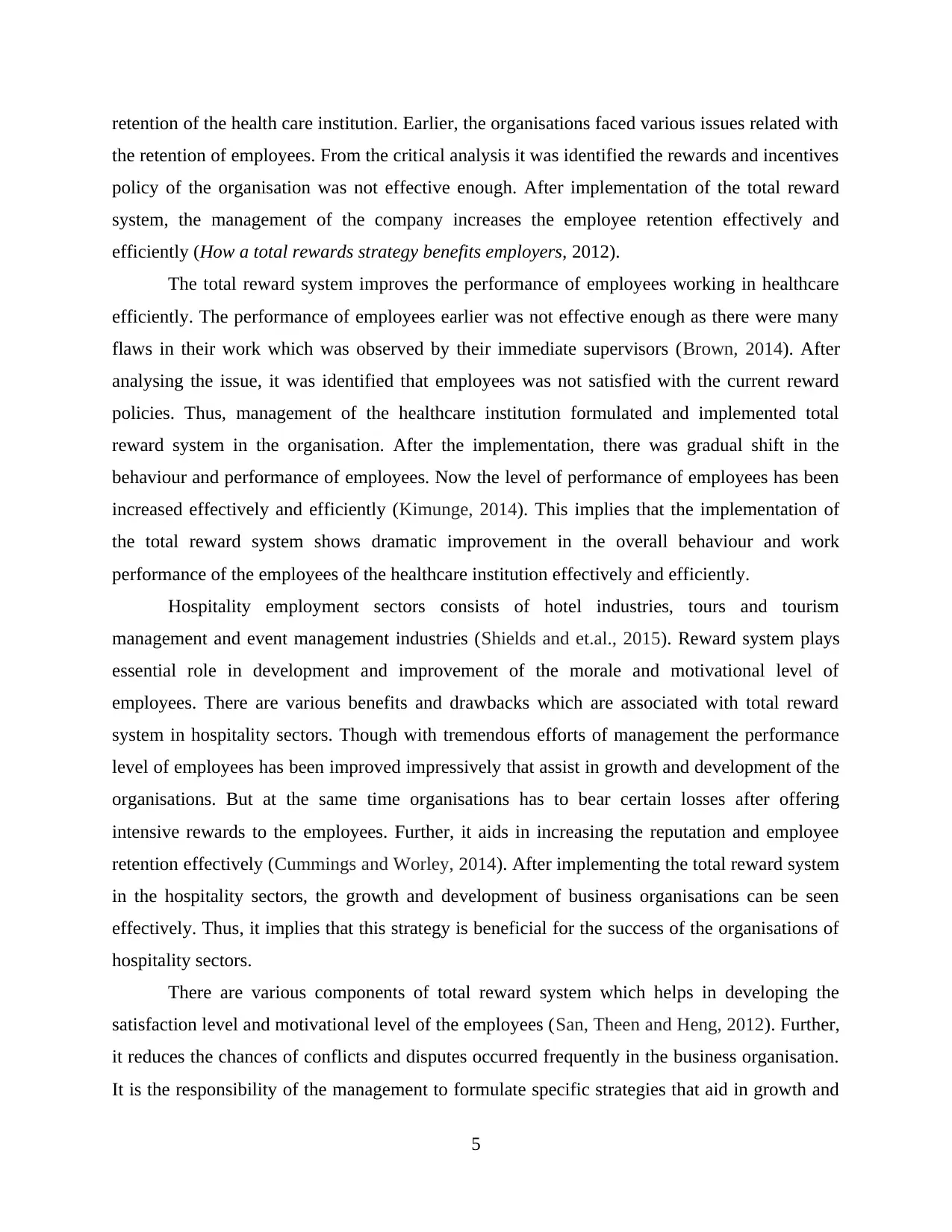
retention of the health care institution. Earlier, the organisations faced various issues related with
the retention of employees. From the critical analysis it was identified the rewards and incentives
policy of the organisation was not effective enough. After implementation of the total reward
system, the management of the company increases the employee retention effectively and
efficiently (How a total rewards strategy benefits employers, 2012).
The total reward system improves the performance of employees working in healthcare
efficiently. The performance of employees earlier was not effective enough as there were many
flaws in their work which was observed by their immediate supervisors (Brown, 2014). After
analysing the issue, it was identified that employees was not satisfied with the current reward
policies. Thus, management of the healthcare institution formulated and implemented total
reward system in the organisation. After the implementation, there was gradual shift in the
behaviour and performance of employees. Now the level of performance of employees has been
increased effectively and efficiently (Kimunge, 2014). This implies that the implementation of
the total reward system shows dramatic improvement in the overall behaviour and work
performance of the employees of the healthcare institution effectively and efficiently.
Hospitality employment sectors consists of hotel industries, tours and tourism
management and event management industries (Shields and et.al., 2015). Reward system plays
essential role in development and improvement of the morale and motivational level of
employees. There are various benefits and drawbacks which are associated with total reward
system in hospitality sectors. Though with tremendous efforts of management the performance
level of employees has been improved impressively that assist in growth and development of the
organisations. But at the same time organisations has to bear certain losses after offering
intensive rewards to the employees. Further, it aids in increasing the reputation and employee
retention effectively (Cummings and Worley, 2014). After implementing the total reward system
in the hospitality sectors, the growth and development of business organisations can be seen
effectively. Thus, it implies that this strategy is beneficial for the success of the organisations of
hospitality sectors.
There are various components of total reward system which helps in developing the
satisfaction level and motivational level of the employees (San, Theen and Heng, 2012). Further,
it reduces the chances of conflicts and disputes occurred frequently in the business organisation.
It is the responsibility of the management to formulate specific strategies that aid in growth and
5
the retention of employees. From the critical analysis it was identified the rewards and incentives
policy of the organisation was not effective enough. After implementation of the total reward
system, the management of the company increases the employee retention effectively and
efficiently (How a total rewards strategy benefits employers, 2012).
The total reward system improves the performance of employees working in healthcare
efficiently. The performance of employees earlier was not effective enough as there were many
flaws in their work which was observed by their immediate supervisors (Brown, 2014). After
analysing the issue, it was identified that employees was not satisfied with the current reward
policies. Thus, management of the healthcare institution formulated and implemented total
reward system in the organisation. After the implementation, there was gradual shift in the
behaviour and performance of employees. Now the level of performance of employees has been
increased effectively and efficiently (Kimunge, 2014). This implies that the implementation of
the total reward system shows dramatic improvement in the overall behaviour and work
performance of the employees of the healthcare institution effectively and efficiently.
Hospitality employment sectors consists of hotel industries, tours and tourism
management and event management industries (Shields and et.al., 2015). Reward system plays
essential role in development and improvement of the morale and motivational level of
employees. There are various benefits and drawbacks which are associated with total reward
system in hospitality sectors. Though with tremendous efforts of management the performance
level of employees has been improved impressively that assist in growth and development of the
organisations. But at the same time organisations has to bear certain losses after offering
intensive rewards to the employees. Further, it aids in increasing the reputation and employee
retention effectively (Cummings and Worley, 2014). After implementing the total reward system
in the hospitality sectors, the growth and development of business organisations can be seen
effectively. Thus, it implies that this strategy is beneficial for the success of the organisations of
hospitality sectors.
There are various components of total reward system which helps in developing the
satisfaction level and motivational level of the employees (San, Theen and Heng, 2012). Further,
it reduces the chances of conflicts and disputes occurred frequently in the business organisation.
It is the responsibility of the management to formulate specific strategies that aid in growth and
5
⊘ This is a preview!⊘
Do you want full access?
Subscribe today to unlock all pages.

Trusted by 1+ million students worldwide
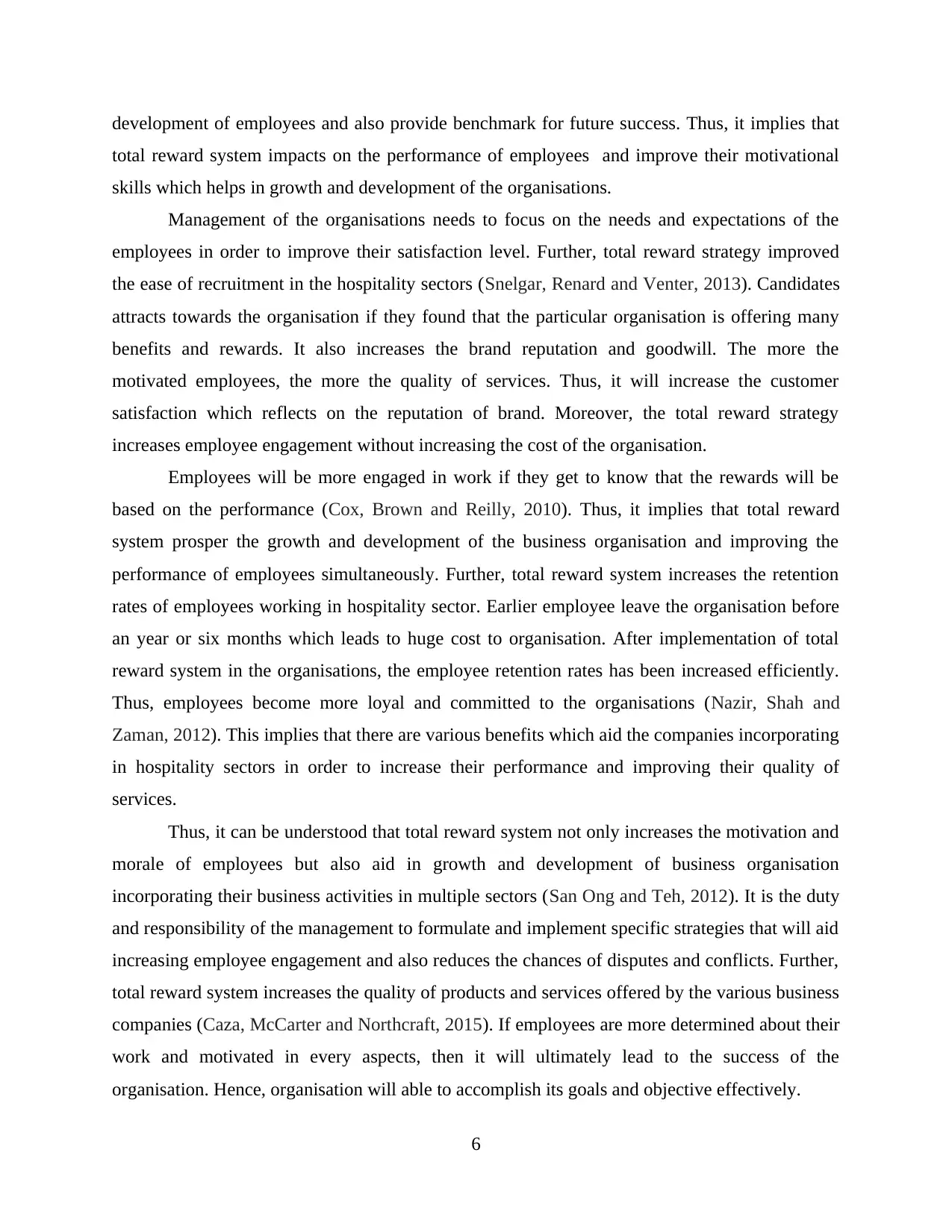
development of employees and also provide benchmark for future success. Thus, it implies that
total reward system impacts on the performance of employees and improve their motivational
skills which helps in growth and development of the organisations.
Management of the organisations needs to focus on the needs and expectations of the
employees in order to improve their satisfaction level. Further, total reward strategy improved
the ease of recruitment in the hospitality sectors (Snelgar, Renard and Venter, 2013). Candidates
attracts towards the organisation if they found that the particular organisation is offering many
benefits and rewards. It also increases the brand reputation and goodwill. The more the
motivated employees, the more the quality of services. Thus, it will increase the customer
satisfaction which reflects on the reputation of brand. Moreover, the total reward strategy
increases employee engagement without increasing the cost of the organisation.
Employees will be more engaged in work if they get to know that the rewards will be
based on the performance (Cox, Brown and Reilly, 2010). Thus, it implies that total reward
system prosper the growth and development of the business organisation and improving the
performance of employees simultaneously. Further, total reward system increases the retention
rates of employees working in hospitality sector. Earlier employee leave the organisation before
an year or six months which leads to huge cost to organisation. After implementation of total
reward system in the organisations, the employee retention rates has been increased efficiently.
Thus, employees become more loyal and committed to the organisations (Nazir, Shah and
Zaman, 2012). This implies that there are various benefits which aid the companies incorporating
in hospitality sectors in order to increase their performance and improving their quality of
services.
Thus, it can be understood that total reward system not only increases the motivation and
morale of employees but also aid in growth and development of business organisation
incorporating their business activities in multiple sectors (San Ong and Teh, 2012). It is the duty
and responsibility of the management to formulate and implement specific strategies that will aid
increasing employee engagement and also reduces the chances of disputes and conflicts. Further,
total reward system increases the quality of products and services offered by the various business
companies (Caza, McCarter and Northcraft, 2015). If employees are more determined about their
work and motivated in every aspects, then it will ultimately lead to the success of the
organisation. Hence, organisation will able to accomplish its goals and objective effectively.
6
total reward system impacts on the performance of employees and improve their motivational
skills which helps in growth and development of the organisations.
Management of the organisations needs to focus on the needs and expectations of the
employees in order to improve their satisfaction level. Further, total reward strategy improved
the ease of recruitment in the hospitality sectors (Snelgar, Renard and Venter, 2013). Candidates
attracts towards the organisation if they found that the particular organisation is offering many
benefits and rewards. It also increases the brand reputation and goodwill. The more the
motivated employees, the more the quality of services. Thus, it will increase the customer
satisfaction which reflects on the reputation of brand. Moreover, the total reward strategy
increases employee engagement without increasing the cost of the organisation.
Employees will be more engaged in work if they get to know that the rewards will be
based on the performance (Cox, Brown and Reilly, 2010). Thus, it implies that total reward
system prosper the growth and development of the business organisation and improving the
performance of employees simultaneously. Further, total reward system increases the retention
rates of employees working in hospitality sector. Earlier employee leave the organisation before
an year or six months which leads to huge cost to organisation. After implementation of total
reward system in the organisations, the employee retention rates has been increased efficiently.
Thus, employees become more loyal and committed to the organisations (Nazir, Shah and
Zaman, 2012). This implies that there are various benefits which aid the companies incorporating
in hospitality sectors in order to increase their performance and improving their quality of
services.
Thus, it can be understood that total reward system not only increases the motivation and
morale of employees but also aid in growth and development of business organisation
incorporating their business activities in multiple sectors (San Ong and Teh, 2012). It is the duty
and responsibility of the management to formulate and implement specific strategies that will aid
increasing employee engagement and also reduces the chances of disputes and conflicts. Further,
total reward system increases the quality of products and services offered by the various business
companies (Caza, McCarter and Northcraft, 2015). If employees are more determined about their
work and motivated in every aspects, then it will ultimately lead to the success of the
organisation. Hence, organisation will able to accomplish its goals and objective effectively.
6
Paraphrase This Document
Need a fresh take? Get an instant paraphrase of this document with our AI Paraphraser
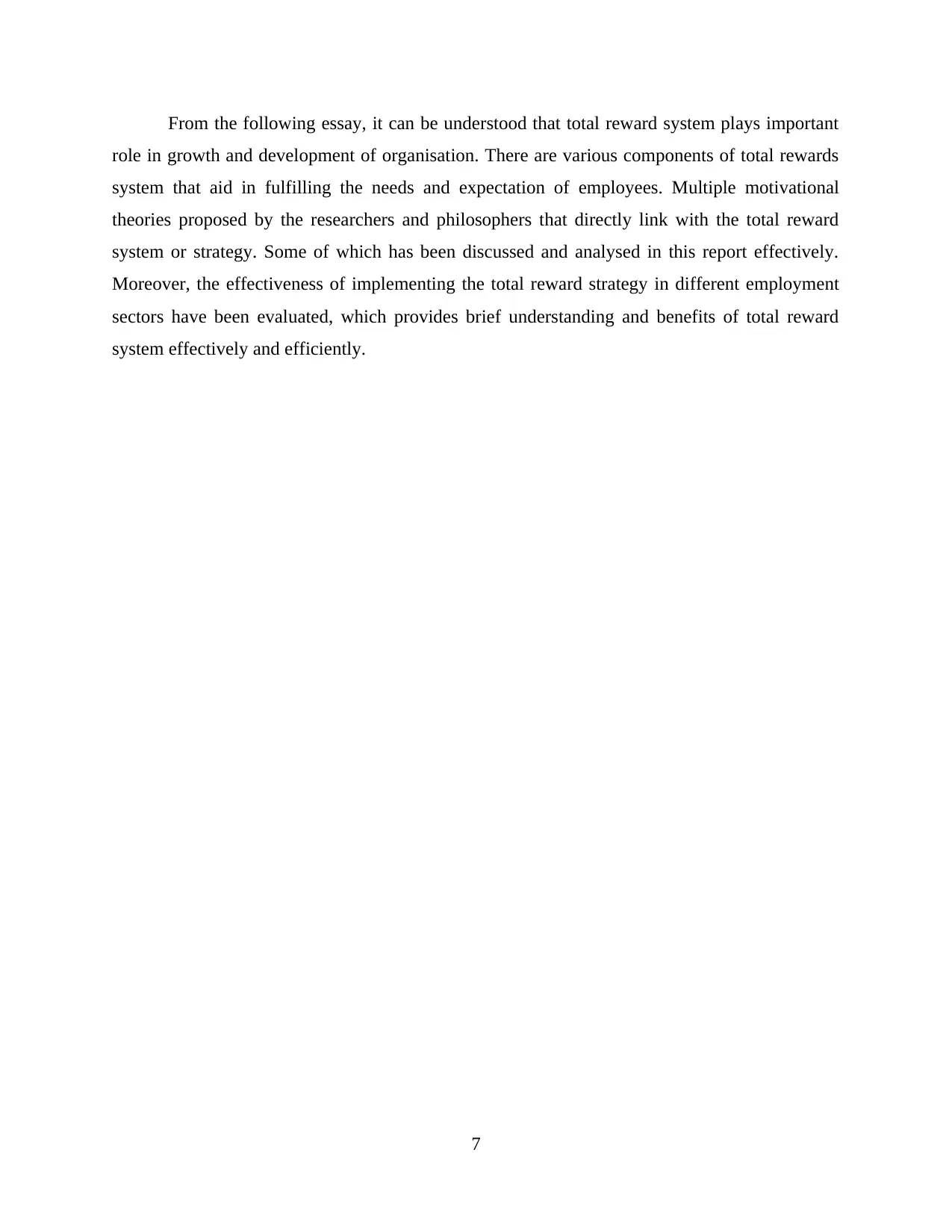
From the following essay, it can be understood that total reward system plays important
role in growth and development of organisation. There are various components of total rewards
system that aid in fulfilling the needs and expectation of employees. Multiple motivational
theories proposed by the researchers and philosophers that directly link with the total reward
system or strategy. Some of which has been discussed and analysed in this report effectively.
Moreover, the effectiveness of implementing the total reward strategy in different employment
sectors have been evaluated, which provides brief understanding and benefits of total reward
system effectively and efficiently.
7
role in growth and development of organisation. There are various components of total rewards
system that aid in fulfilling the needs and expectation of employees. Multiple motivational
theories proposed by the researchers and philosophers that directly link with the total reward
system or strategy. Some of which has been discussed and analysed in this report effectively.
Moreover, the effectiveness of implementing the total reward strategy in different employment
sectors have been evaluated, which provides brief understanding and benefits of total reward
system effectively and efficiently.
7
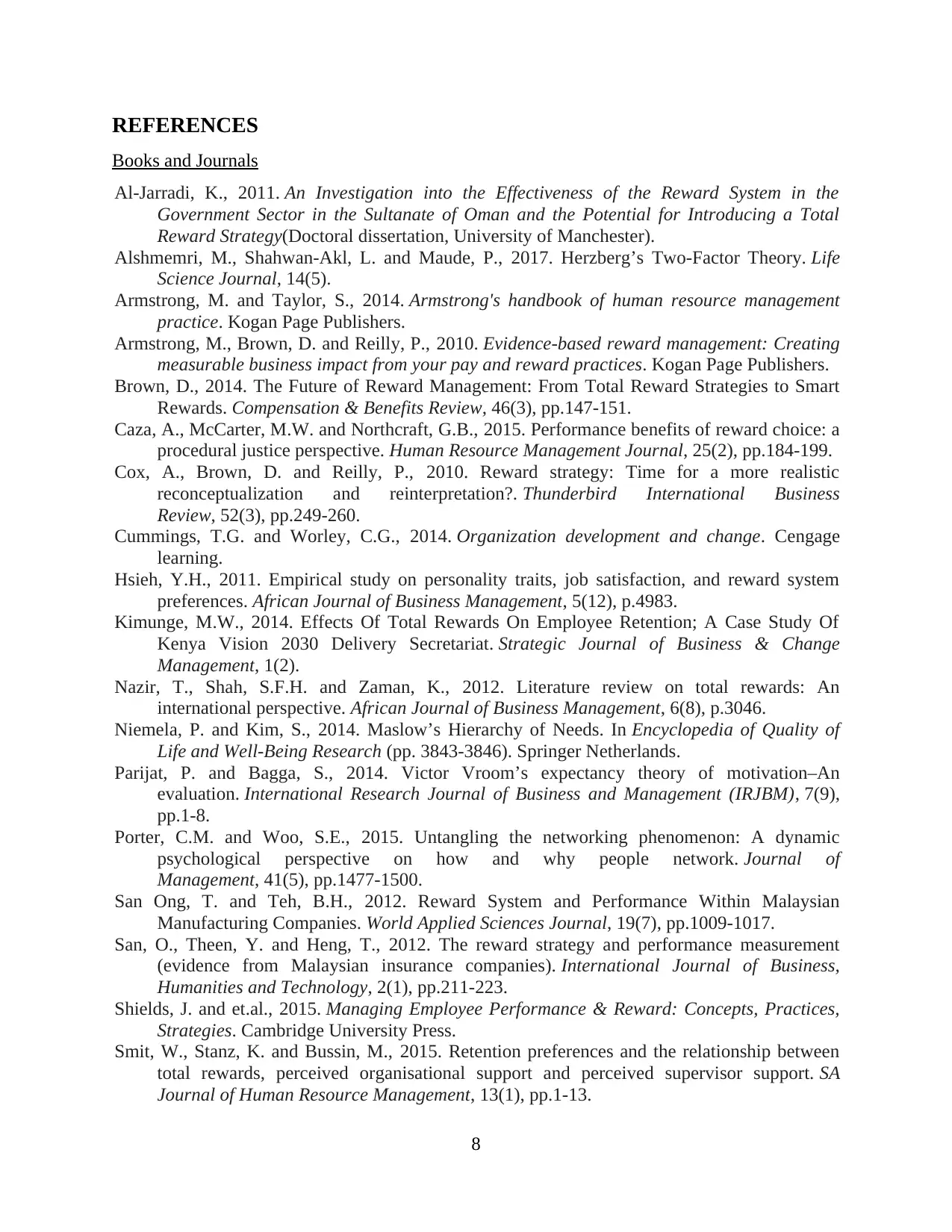
REFERENCES
Books and Journals
Al-Jarradi, K., 2011. An Investigation into the Effectiveness of the Reward System in the
Government Sector in the Sultanate of Oman and the Potential for Introducing a Total
Reward Strategy(Doctoral dissertation, University of Manchester).
Alshmemri, M., Shahwan-Akl, L. and Maude, P., 2017. Herzberg’s Two-Factor Theory. Life
Science Journal, 14(5).
Armstrong, M. and Taylor, S., 2014. Armstrong's handbook of human resource management
practice. Kogan Page Publishers.
Armstrong, M., Brown, D. and Reilly, P., 2010. Evidence-based reward management: Creating
measurable business impact from your pay and reward practices. Kogan Page Publishers.
Brown, D., 2014. The Future of Reward Management: From Total Reward Strategies to Smart
Rewards. Compensation & Benefits Review, 46(3), pp.147-151.
Caza, A., McCarter, M.W. and Northcraft, G.B., 2015. Performance benefits of reward choice: a
procedural justice perspective. Human Resource Management Journal, 25(2), pp.184-199.
Cox, A., Brown, D. and Reilly, P., 2010. Reward strategy: Time for a more realistic
reconceptualization and reinterpretation?. Thunderbird International Business
Review, 52(3), pp.249-260.
Cummings, T.G. and Worley, C.G., 2014. Organization development and change. Cengage
learning.
Hsieh, Y.H., 2011. Empirical study on personality traits, job satisfaction, and reward system
preferences. African Journal of Business Management, 5(12), p.4983.
Kimunge, M.W., 2014. Effects Of Total Rewards On Employee Retention; A Case Study Of
Kenya Vision 2030 Delivery Secretariat. Strategic Journal of Business & Change
Management, 1(2).
Nazir, T., Shah, S.F.H. and Zaman, K., 2012. Literature review on total rewards: An
international perspective. African Journal of Business Management, 6(8), p.3046.
Niemela, P. and Kim, S., 2014. Maslow’s Hierarchy of Needs. In Encyclopedia of Quality of
Life and Well-Being Research (pp. 3843-3846). Springer Netherlands.
Parijat, P. and Bagga, S., 2014. Victor Vroom’s expectancy theory of motivation–An
evaluation. International Research Journal of Business and Management (IRJBM), 7(9),
pp.1-8.
Porter, C.M. and Woo, S.E., 2015. Untangling the networking phenomenon: A dynamic
psychological perspective on how and why people network. Journal of
Management, 41(5), pp.1477-1500.
San Ong, T. and Teh, B.H., 2012. Reward System and Performance Within Malaysian
Manufacturing Companies. World Applied Sciences Journal, 19(7), pp.1009-1017.
San, O., Theen, Y. and Heng, T., 2012. The reward strategy and performance measurement
(evidence from Malaysian insurance companies). International Journal of Business,
Humanities and Technology, 2(1), pp.211-223.
Shields, J. and et.al., 2015. Managing Employee Performance & Reward: Concepts, Practices,
Strategies. Cambridge University Press.
Smit, W., Stanz, K. and Bussin, M., 2015. Retention preferences and the relationship between
total rewards, perceived organisational support and perceived supervisor support. SA
Journal of Human Resource Management, 13(1), pp.1-13.
8
Books and Journals
Al-Jarradi, K., 2011. An Investigation into the Effectiveness of the Reward System in the
Government Sector in the Sultanate of Oman and the Potential for Introducing a Total
Reward Strategy(Doctoral dissertation, University of Manchester).
Alshmemri, M., Shahwan-Akl, L. and Maude, P., 2017. Herzberg’s Two-Factor Theory. Life
Science Journal, 14(5).
Armstrong, M. and Taylor, S., 2014. Armstrong's handbook of human resource management
practice. Kogan Page Publishers.
Armstrong, M., Brown, D. and Reilly, P., 2010. Evidence-based reward management: Creating
measurable business impact from your pay and reward practices. Kogan Page Publishers.
Brown, D., 2014. The Future of Reward Management: From Total Reward Strategies to Smart
Rewards. Compensation & Benefits Review, 46(3), pp.147-151.
Caza, A., McCarter, M.W. and Northcraft, G.B., 2015. Performance benefits of reward choice: a
procedural justice perspective. Human Resource Management Journal, 25(2), pp.184-199.
Cox, A., Brown, D. and Reilly, P., 2010. Reward strategy: Time for a more realistic
reconceptualization and reinterpretation?. Thunderbird International Business
Review, 52(3), pp.249-260.
Cummings, T.G. and Worley, C.G., 2014. Organization development and change. Cengage
learning.
Hsieh, Y.H., 2011. Empirical study on personality traits, job satisfaction, and reward system
preferences. African Journal of Business Management, 5(12), p.4983.
Kimunge, M.W., 2014. Effects Of Total Rewards On Employee Retention; A Case Study Of
Kenya Vision 2030 Delivery Secretariat. Strategic Journal of Business & Change
Management, 1(2).
Nazir, T., Shah, S.F.H. and Zaman, K., 2012. Literature review on total rewards: An
international perspective. African Journal of Business Management, 6(8), p.3046.
Niemela, P. and Kim, S., 2014. Maslow’s Hierarchy of Needs. In Encyclopedia of Quality of
Life and Well-Being Research (pp. 3843-3846). Springer Netherlands.
Parijat, P. and Bagga, S., 2014. Victor Vroom’s expectancy theory of motivation–An
evaluation. International Research Journal of Business and Management (IRJBM), 7(9),
pp.1-8.
Porter, C.M. and Woo, S.E., 2015. Untangling the networking phenomenon: A dynamic
psychological perspective on how and why people network. Journal of
Management, 41(5), pp.1477-1500.
San Ong, T. and Teh, B.H., 2012. Reward System and Performance Within Malaysian
Manufacturing Companies. World Applied Sciences Journal, 19(7), pp.1009-1017.
San, O., Theen, Y. and Heng, T., 2012. The reward strategy and performance measurement
(evidence from Malaysian insurance companies). International Journal of Business,
Humanities and Technology, 2(1), pp.211-223.
Shields, J. and et.al., 2015. Managing Employee Performance & Reward: Concepts, Practices,
Strategies. Cambridge University Press.
Smit, W., Stanz, K. and Bussin, M., 2015. Retention preferences and the relationship between
total rewards, perceived organisational support and perceived supervisor support. SA
Journal of Human Resource Management, 13(1), pp.1-13.
8
⊘ This is a preview!⊘
Do you want full access?
Subscribe today to unlock all pages.

Trusted by 1+ million students worldwide
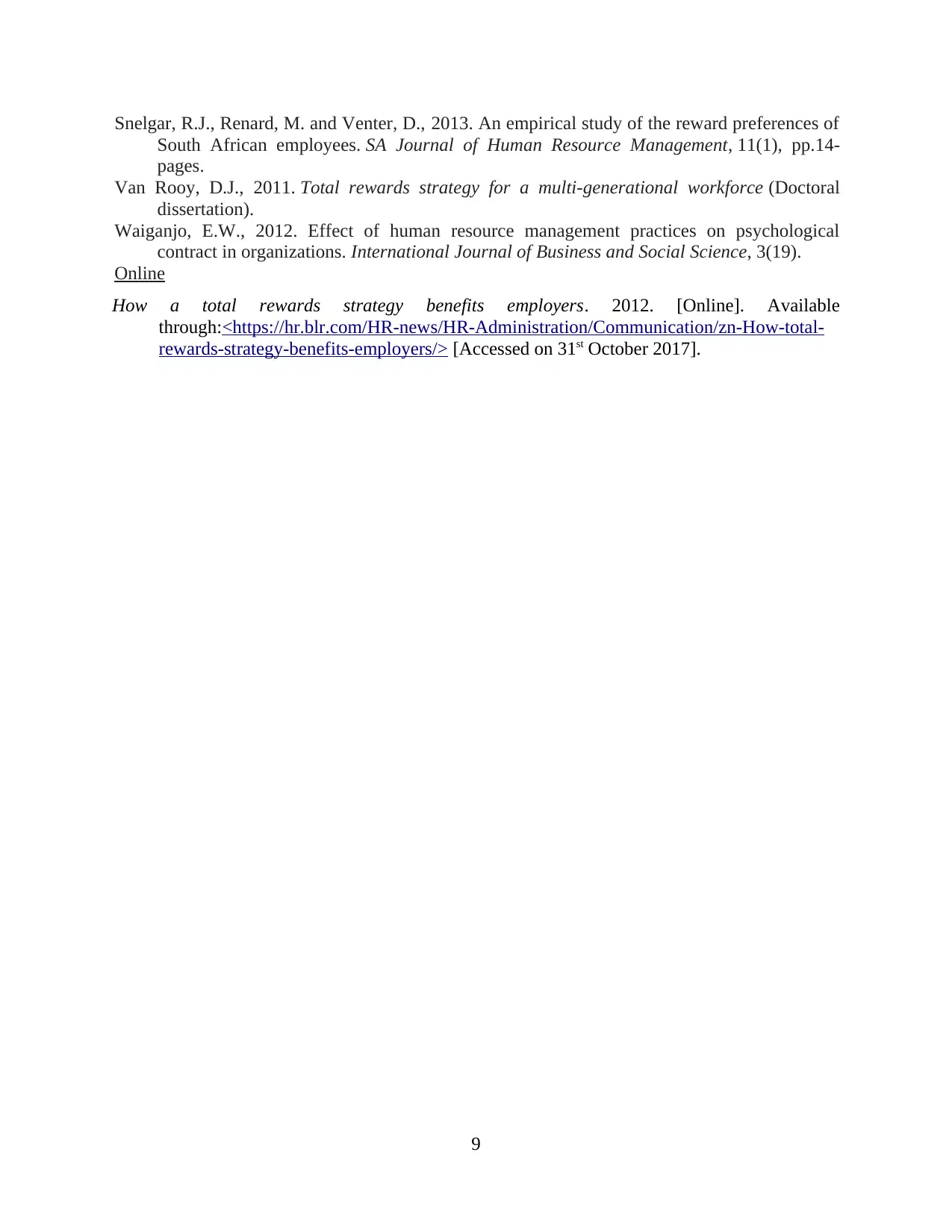
Snelgar, R.J., Renard, M. and Venter, D., 2013. An empirical study of the reward preferences of
South African employees. SA Journal of Human Resource Management, 11(1), pp.14-
pages.
Van Rooy, D.J., 2011. Total rewards strategy for a multi-generational workforce (Doctoral
dissertation).
Waiganjo, E.W., 2012. Effect of human resource management practices on psychological
contract in organizations. International Journal of Business and Social Science, 3(19).
Online
How a total rewards strategy benefits employers. 2012. [Online]. Available
through:<https://hr.blr.com/HR-news/HR-Administration/Communication/zn-How-total-
rewards-strategy-benefits-employers/> [Accessed on 31st October 2017].
9
South African employees. SA Journal of Human Resource Management, 11(1), pp.14-
pages.
Van Rooy, D.J., 2011. Total rewards strategy for a multi-generational workforce (Doctoral
dissertation).
Waiganjo, E.W., 2012. Effect of human resource management practices on psychological
contract in organizations. International Journal of Business and Social Science, 3(19).
Online
How a total rewards strategy benefits employers. 2012. [Online]. Available
through:<https://hr.blr.com/HR-news/HR-Administration/Communication/zn-How-total-
rewards-strategy-benefits-employers/> [Accessed on 31st October 2017].
9
1 out of 10
Related Documents
Your All-in-One AI-Powered Toolkit for Academic Success.
+13062052269
info@desklib.com
Available 24*7 on WhatsApp / Email
![[object Object]](/_next/static/media/star-bottom.7253800d.svg)
Unlock your academic potential
Copyright © 2020–2026 A2Z Services. All Rights Reserved. Developed and managed by ZUCOL.





